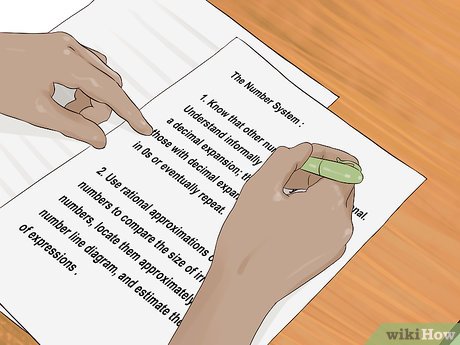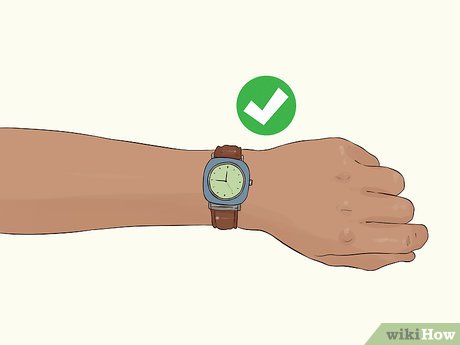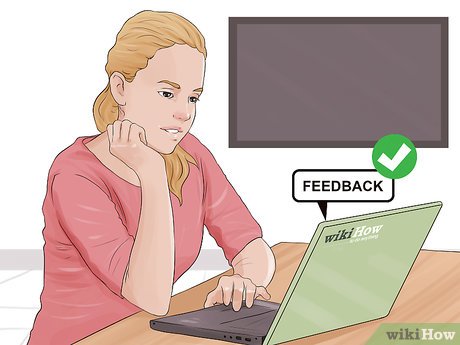How to Be a Successful Graduate Assistant
Part 1 of 4:
Being a Successful Teaching Assistant
-
 Set clear expectations and goals. The most important thing you can do to help students succeed in your class is to clearly communicate to them what you expect them to learn and how you expect them to demonstrate their knowledge. This will make the whole semester go much more smoothly.
Set clear expectations and goals. The most important thing you can do to help students succeed in your class is to clearly communicate to them what you expect them to learn and how you expect them to demonstrate their knowledge. This will make the whole semester go much more smoothly.- A well-outlined syllabus will help students understand the progression of the course.
- Clear course objectives will help you communicate what skills students need to acquire by what dates.
- A grading rubric is a very useful tool. The better you communicate the standards that you use to grade, the less likely students will be to argue with you about their grades.
-
 Lecture effectively. If you've never taught a class before, the thought of lecturing to a room full of students may be a little intimidating. Being prepared for each lecture and paying attention to the way you present yourself will make your lectures much more enjoyable for both you and your students.
Lecture effectively. If you've never taught a class before, the thought of lecturing to a room full of students may be a little intimidating. Being prepared for each lecture and paying attention to the way you present yourself will make your lectures much more enjoyable for both you and your students.- Plan ahead so that you will always know exactly what you will be lecturing on each day. It's a good idea to practice your lecture so you can be reasonably sure that it will take up the entire class period without being rushed.
- Pay attention to the volume of your voice and the pace of your speech. If you're talking too softly or too fast, students may not be able to understand you. You may want to consider asking a few students for feedback if you're not sure.
- Make use of the blackboard to write down important points in an organized fashion. This will help students take coherent notes. Be sure that your handwriting is legible.
- If possible, circulate around the room instead of staying at your desk or behind your lectern. This will make the students feel like you are more actively engaged.
-
 Encourage classroom discussion. Depending on the kind of class you are teaching, you may want to incorporate classroom discussions into your syllabus to break up your lecturing. This will give students the opportunity to debate their opinions and make their own connections to the course material.
Encourage classroom discussion. Depending on the kind of class you are teaching, you may want to incorporate classroom discussions into your syllabus to break up your lecturing. This will give students the opportunity to debate their opinions and make their own connections to the course material.- This works especially well for small classes, but you may be able to implement discussion even in larger groups. If you have too many students for a whole-class discussion, consider breaking them into smaller groups.
- Letting students know before class that you will be having a class discussion about a particular topic will give them time to prepare, which may make them more likely to participate.
-
 Make yourself available during office hours. In addition to teaching classes, you will likely also be required to hold office hours every week, during which time students can come talk to you about their work. It's a good idea to encourage students to come see you, especially if they are struggling in your class. When they do come, be welcoming and offer helpful feedback to them to help them improve their performance.
Make yourself available during office hours. In addition to teaching classes, you will likely also be required to hold office hours every week, during which time students can come talk to you about their work. It's a good idea to encourage students to come see you, especially if they are struggling in your class. When they do come, be welcoming and offer helpful feedback to them to help them improve their performance.- If you find that no students are coming to your office hours, you may want to consider making one appointment each semester mandatory. This will give you the opportunity to get to know each student a bit better, and it may make them more comfortable coming to see you in the future.
- You may have to share an office with other graduate assistants, so it's a good idea to work together to create a schedule that works for everyone.
-
 Grade fairly. When it comes time to grade your students' assignments, always be objective and stick to your grading rubric. It's a good idea to go over your grades with your mentor professor to make sure you both agree on the standards you are holding students to.
Grade fairly. When it comes time to grade your students' assignments, always be objective and stick to your grading rubric. It's a good idea to go over your grades with your mentor professor to make sure you both agree on the standards you are holding students to.- It's also important to grade in a timely manner. Grading can be time consuming, but it's not fair to keep students waiting for weeks for their grades.
-
 Be professional in your dealings with students. If you are interacting with undergraduate students as a part of your graduate assistantship, it's important to approach these relationships professionally. Be sure to let them know that you are their teacher, not their friend, even if you are close to the same age.
Be professional in your dealings with students. If you are interacting with undergraduate students as a part of your graduate assistantship, it's important to approach these relationships professionally. Be sure to let them know that you are their teacher, not their friend, even if you are close to the same age.- Don't flirt or get personal. Avoid adding your students as friends on social media.
- If you have difficulties with a student in class, immediately document the incident in an email to your supervisor.
- It's also important to respect the confidentiality of your students' personal information, including grades.[1]
Part 2 of 4:
Succeeding as a Research Assistant
-
 Be meticulous. Whether you are working in a lab or doing legal research, put your all into everything you do and leave no question unanswered. This will help you demonstrate to your superiors that you are hard-working and intelligent.
Be meticulous. Whether you are working in a lab or doing legal research, put your all into everything you do and leave no question unanswered. This will help you demonstrate to your superiors that you are hard-working and intelligent.- Apply this theory of practice even if you are doing something completely straightforward, like cleaning up your work station.
-
 Be curious. Curiosity can really help you get the most out of your experience as a graduate assistant. No matter what kind of project you are working on, always think about what more could be done. If you have an idea for a new angle of research, discuss it with your supervisor.
Be curious. Curiosity can really help you get the most out of your experience as a graduate assistant. No matter what kind of project you are working on, always think about what more could be done. If you have an idea for a new angle of research, discuss it with your supervisor.- This will not only make you look good to your supervisors and help you learn more, but it will also make your experience much more enjoyable because you can constantly be looking for ways that you can contribute by doing the kind of work that most interests you.
-
 Hone your research skills. As a graduate research assistant, you are essentially being paid to learn how to become a better researcher. You will be working alongside many more experienced researchers, so take advantage of the opportunity to learn from them.[2]
Hone your research skills. As a graduate research assistant, you are essentially being paid to learn how to become a better researcher. You will be working alongside many more experienced researchers, so take advantage of the opportunity to learn from them.[2]- Don't be afraid to ask questions and request feedback from your colleagues.
- Work collaboratively whenever you can. This will give you more exposure to your colleagues' ways of thinking and methods of research, which can really help you develop as a researcher.
Part 3 of 4:
Presenting Yourself in a Professional Manner
-
 Dress professionally. As a graduate assistant, you will be expected to present yourself in a professional way, just as you would at any other job. This starts with dressing like a professional.[3]
Dress professionally. As a graduate assistant, you will be expected to present yourself in a professional way, just as you would at any other job. This starts with dressing like a professional.[3]- The correct attire will depend on what kind of work you will be doing as a graduate assistant. For example, you will probably want to dress more formally if you will be teaching classes than you will if you will be working in a lab.
- If you are unsure about how to dress for your first day as a graduate assistant, ask your supervisor what the dress code is.
-
 Show up on time. It's extremely important to make a good impression on your supervisor and demonstrate that you are a hard-working graduate assistant. You can do this by always showing up for work on time (or early). If your hours are flexible, make sure you are still meeting the expectations.
Show up on time. It's extremely important to make a good impression on your supervisor and demonstrate that you are a hard-working graduate assistant. You can do this by always showing up for work on time (or early). If your hours are flexible, make sure you are still meeting the expectations.- You should have a good understanding of what your schedule will be like before you start working as a graduate assistant. If you are unsure what your schedule will be, arrange a meeting with your supervisor to go over the expectations.[4]
- It's also important to show up to any meetings that you are invited to, even if they are not mandatory. Unless you are unable to attend because of a class, you should do your best to be there.
-
 Treat others with respect. Always be polite and respectful to everyone you meet, no matter who they are. Do not act as though you are superior to others just because you are a graduate assistant. Being demeaning to others will reflect poorly on you and may come back to haunt you.
Treat others with respect. Always be polite and respectful to everyone you meet, no matter who they are. Do not act as though you are superior to others just because you are a graduate assistant. Being demeaning to others will reflect poorly on you and may come back to haunt you.- Everyone deserves your respect, including your peers, your superiors, your students, and the support staff that you will be working with.
- Don't assume that you can call everyone by their first names. Call your superiors by their professional titles (Professor Jones or Dr. Yates) unless they tell you otherwise.
-
 Avoid complaining. During your time as a graduate assistant, you will likely encounter at least one situation that aggravates you. While you may be tempted to vent about it to other graduate assistants or university employees, it's usually best to keep your complaints to yourself. You do not want to be seen as a whiner, especially if you are hoping to be re-hired as a graduate assistant next year.
Avoid complaining. During your time as a graduate assistant, you will likely encounter at least one situation that aggravates you. While you may be tempted to vent about it to other graduate assistants or university employees, it's usually best to keep your complaints to yourself. You do not want to be seen as a whiner, especially if you are hoping to be re-hired as a graduate assistant next year.- You may have to deal with equipment that is less than state-of-the-art, and it's important to make the best of this situation. Instead of complaining about the technology, think of it as a good opportunity to hone your problem-solving skills.
- You may see inefficiencies in the way that your supervisor works, but it's usually best to accept them and move on. Depending on the situation and the relationship you have with your supervisor, you may want to suggest improvements that could be made, but you should always do this in a constructive, non-judgmental way.
-
 Maintain a professional social media presence. Before you accept any kind of professional role, it's always a good idea to make sure that your online presence does not reflect poorly on you. Take a good look at your accounts and get rid of anything that you would not want your superiors or your students to see.[5]
Maintain a professional social media presence. Before you accept any kind of professional role, it's always a good idea to make sure that your online presence does not reflect poorly on you. Take a good look at your accounts and get rid of anything that you would not want your superiors or your students to see.[5]- Change your privacy settings so that strangers cannot see your personal posts.
- Even if your account is private, avoid posting anything inappropriate or offensive. You never know who might share it!
- Consider creating a professional social media account to connect with colleagues. LinkedIn is a good choice.
Part 4 of 4:
Managing Expectations
-
 Be flexible. Graduate assistants are often asked to help their supervisors in a variety of different ways, and it's important that you be willing to do pretty much anything that is asked of you. Even if you do not enjoy a particular task, agreeing to do it will help ensure that your supervisor values your contributions, and it will help you develop skills that you will need in the future.
Be flexible. Graduate assistants are often asked to help their supervisors in a variety of different ways, and it's important that you be willing to do pretty much anything that is asked of you. Even if you do not enjoy a particular task, agreeing to do it will help ensure that your supervisor values your contributions, and it will help you develop skills that you will need in the future.- It's important not to go into a graduate assistantship with overly high expectations of the kind of work you will be doing, as this may lead to disappointment. You should expect to deal with at least some grunt work, like grading papers or entering data.
- Try to see everything as a learning opportunity, no matter how menial the task may seem.
-
 Balance your studies and your work responsibilities. As a graduate assistant, you are both a student and an employee at the university, and it's important that you dedicate enough time and energy to both roles. Be careful not to neglect your studies for your job, or vice versa.[6]
Balance your studies and your work responsibilities. As a graduate assistant, you are both a student and an employee at the university, and it's important that you dedicate enough time and energy to both roles. Be careful not to neglect your studies for your job, or vice versa.[6]- If you feel that you are not able to keep up with the demands of your classes due to a busy work schedule, talk to your supervisor about it. You may be able to work out an arrangement that will be more favorable to your class schedule.
- Unless you are told otherwise, you should not be working on class assignments during work hours. Instead, you should be using this time to contribute to the department's goals to the best of your abilities.
-
 Make the most of your relationship with your mentor. You will have a lot of control over the relationship that you have with your mentor: you can choose to forge a strong relationship with him or her and get as much input as you can, or you can choose to keep to yourself. It's in your best interest to take advantage of all the time you have to work with your mentor.[7]
Make the most of your relationship with your mentor. You will have a lot of control over the relationship that you have with your mentor: you can choose to forge a strong relationship with him or her and get as much input as you can, or you can choose to keep to yourself. It's in your best interest to take advantage of all the time you have to work with your mentor.[7]- You're much more likely to be given rewarding work to do if your mentor comes to see you as a valuable employee, so work hard to make a good impression.
- Keep in mind that your mentor may be able to help you after you graduate by writing you a recommendation letter or putting you in contact with other industry professionals. The better your relationship, the more helpful he or she will be to you.
-
 Value and respond to feedback. It can be hard to get negative feedback on work that you've done, but try not to get defensive about it. If your mentor or another colleague lets you know that you could have done something better, listen carefully to what they have to say and implement their suggestions in your future work.
Value and respond to feedback. It can be hard to get negative feedback on work that you've done, but try not to get defensive about it. If your mentor or another colleague lets you know that you could have done something better, listen carefully to what they have to say and implement their suggestions in your future work.- If the feedback is not constructive, consider asking how you can improve your work.
- Remember that you are here to learn, so you should not expect yourself to be perfect. Do your best and always look for ways in which you can improve your work.
- Always take responsibility for your own mistakes instead of trying to blame them on someone else or make excuses for them.
-
 Talk to your boss about expectations and conflicts. You will have a much easier time succeeding as a graduate assistant if you communicate well with your boss, both when there is a problem and when there is not. Open the channels of communication early on and keep them open throughout your graduate assistantship.
Talk to your boss about expectations and conflicts. You will have a much easier time succeeding as a graduate assistant if you communicate well with your boss, both when there is a problem and when there is not. Open the channels of communication early on and keep them open throughout your graduate assistantship.- Whenever you start working on something new, try to sit down with your boss and discuss what you both want to come of the project. It's best to make sure that you are both on the same page from the very beginning.
- If there is ever a problem, it helps to address it with your boss as soon as possible. For example, if you believe you are being overworked, sit down with your boss and discuss the problem. If you are both able to share your thoughts in a professional way, you will be more likely to come to a solution that works for everyone.
Share by
Jessica Tanner
Update 24 March 2020


















